The concept of having a meticulous morning routine has long been glorified, especially among successful CEOs and productivity gurus. The idea is simple: by starting your day with a series of disciplined actions, you set yourself up for a productive and successful day. However, this narrative has come under scrutiny. A recent wave of articles and comments has sparked a lively debate on the actual benefits of these routines, and whether they truly align with what most people need to be both productive and fulfilled in their careers.
One commenter, martopix, provided an insightful perspective, noting that while morning routines and the hustle culture can indeed set one up for success, they are not universal solutions. Martopix chose to leave a prestigious and competitive career to become a teacher, finding ’10x personal satisfaction’. Yet, this decision is not without its detractors. Another commenter, jewayne, pointed out that in the U.S., teaching often correlates with low job satisfaction due to various systemic challenges. These conflicting viewpoints highlight an essential question: Is there a one-size-fits-all approach to career satisfaction and productivity?
Moreover, the relentless pursuit of ’10x work’—a much-touted concept in Silicon Valley—has also been criticized for setting unrealistic and often unhealthy expectations. Commenters like throwaway173738 argue that the hustle culture, which promotes ‘home run marketing’ and extraordinary achievements, is unsustainable for the majority. The critique here is that such advice is often cloaked in the rhetoric of success but rooted deeply in hustle culture, making it both idealistic and impractical for many.
The diversity of opinions reflects the broader reality that job satisfaction and productivity are highly subjective and context-specific. For instance, VirusNewbie highlighted that the stressors of a teaching career might vary depending on one’s financial stability. Those who have financial security and fewer financial obligations may find it easier to transition into teaching, finding it less stressful compared to those who are not as financially secure.
Further adding to the debate, a cross-section of comments discussed the role of routines in managing mental health, particularly for individuals with ADHD. Bitexploder emphasized that without routines and habits, managing life’s complexities becomes almost impossible. This sentiment was echoed by several others who contend that while adaptability is key, having a foundational structure can streamline productivity and improve focus.
Interestingly, some commenters like asoneth discussed the delicate balance required in maintaining and re-establishing routines after disruptions, such as vacations or unexpected events. These insights underline a key principle: flexibility within a framework. This principle aligns with the criticisms of rigidly adhering to structured routines or pushing for ’10x work’, suggesting that a more balanced and adaptive approach may yield better long-term results.
In contrast, others like RankingMember argued that the obsession with high productivity often bypasses the reality that most impactful work, or ’10x work,’ inadvertently leaves behind a trail of unaddressed tasks and technical debt. This point resonates deeply with those who have witnessed or experienced burnout due to relentless effort towards high-impact work, only to find themselves cleaning up the mess left by such pursuits.
Ultimately, the debate boils down to the recognition that productivity and career satisfaction are deeply personal constructs. Some find immense value in structured routines and the pursuit of impactful work, while others find solace in more flexible, adaptive approaches. As one commenter, snarf21, aptly put it, ‘the harder you work, the luckier you get’, but this has to be balanced with self-reflection and intentionality. Whether one subscribes to the hustle culture or values a more measured approach, the key is to find what works and remain open to adapting as circumstances evolve. As we navigate these discussions, it’s crucial to remember that success and satisfaction are multifaceted and what works for one person may not necessarily work for another.


Leave a Reply